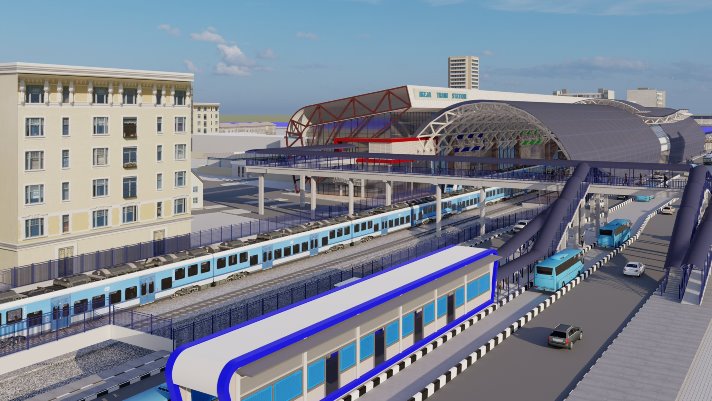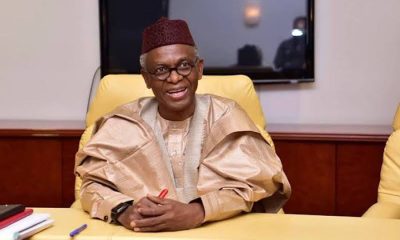metro
What Donald Trump’s second Presidency means for Nigerian economy – Report

What Donald Trump’s second Presidency means for Nigerian economy – Report
Donald Trump’s return to the White House as the 47th President of the United States, following a dramatic victory over Kamala Harris, brings new questions for Nigeria’s economic outlook.
Trump’s economic policies, built around “America First,” prioritize domestic energy production, tariffs on imports, and pushing for low interest rates.
These policies could have a significant impact on Nigeria’s economy, particularly in the areas of exchange rates, capital flows, inflation, and immigration. Below is an analysis of how these shifts could affect Nigeria’s economic landscape.
Key takeaways
Donald Trump’s second term could have sweeping implications for Nigeria’s economy.
- A stronger dollar, potential capital outflows from the U.S., and low global oil prices may add to Nigeria’s exchange rate volatility, putting pressure on the naira and increasing inflation.
- Immigration restrictions could reduce remittance flows, while geopolitical shifts might reduce U.S. support for Nigeria’s security and development needs.
- Nigeria’s policymakers may need to consider alternative strategies, such as fostering regional trade, increasing non-oil exports, and pursuing structural reforms to counterbalance the potential challenges posed by Trump’s policies.”
Exchange Rate pressures from a Stronger Dollar
Trump’s policies could lead to a stronger U.S. dollar, particularly if his administration imposes tariffs that increase demand for domestically produced goods and services.
- A stronger dollar generally makes it more expensive for emerging economies, such as Nigeria, to acquire foreign exchange, potentially straining the Central Bank of Nigeria (CBN)’s efforts to stabilize the naira.
- Nigeria’s naira has depreciated by over 45% this year, and an appreciation of the dollar could further weaken the naira, impacting import costs, inflation, and purchasing power.
- A stronger dollar also increases Nigeria’s debt-servicing costs, as many of Nigeria’s obligations are dollar-denominated.
- Given Nigeria’s reliance on imports for fuel, raw materials, and consumer goods, additional dollar strength could heighten inflationary pressures on already high costs of living.
READ ALSO:
- 22 people dead as Adamawa-Taraba mining pit collapses
- Bandits invade Zamfara communities, abduct Imam, women, children, scores more
- I decide my future, Osimhen tells Napoli on Galatasaray stay
Interest rates and Capital Flows into Nigeria
Historically, Trump has favoured a low-interest-rate environment, pushing the Federal Reserve to maintain a loose monetary policy even during periods of economic growth.
- During Trump’s initial presidency, the Federal Reserve raised interest rates, peaking at 2.5% in 2018 before cutting them near zero by March 2020 to counteract the economic effects of COVID-19.
- Trump’s renewed pressure for lower interest rates could again influence the Federal Reserve’s policy direction.
- If the Federal Reserve keeps rates low, this could, in theory, result in capital outflows from the U.S. as investors seek higher returns in emerging markets.
- However, if dollar strength persists and other global markets remain volatile, investor sentiment may still favour U.S. assets as a safe haven.
From 2016 to 2020, Nigeria attracted approximately $58.1 billion in capital importation, with 2019 seeing the highest inflows at $23 billion.
- This was in part due to Nigeria offering high-yielding instruments like government bonds, which attracted foreign investors—including $4.69 billion from U.S. sources in that year.
- Should Trump’s policies create a continued low-yield environment in the U.S., Nigeria could once again attract U.S.-based capital looking for higher returns, particularly if Nigeria maintains attractive interest rates on its debt instruments.
- This capital inflow could help alleviate Nigeria’s foreign exchange pressures and support naira stability.
Inflation and Trump’s energy policies
Trump’s focus on reducing U.S. energy costs by increasing domestic oil production and drilling on federal lands could mean sustained low global oil prices. In his first term,
- Trump’s policies and the COVID-19 pandemic led to WTI crude oil prices falling sharply to around $39.17 per barrel in 2020, compared to $65.20 per barrel in 2018.
- As Nigeria heavily relies on oil exports for government revenue and foreign exchange, prolonged low oil prices could impact budget stability and government spending, with knock-on effects on inflation and economic growth.
- Furthermore, Trump’s proposed tariffs on imports, including a 60% tariff on Chinese goods, could raise inflation within the U.S., which might trickle down to Nigeria by increasing the cost of imported goods and components.
- Since the U.S. is among Nigeria’s top trading partners (N2.2 trillion in imports and N2.8 trillion in exports in the first half of 2024), a U.S.-led price increase could influence Nigeria’s inflation through costlier imports of essential goods like machinery, pharmaceuticals, and agricultural products.
READ ALSO:
- Kaduna Govt offers N100,000, smartphones to released minors
- Reality star Soma’s ex-girlfriend says he’s a bully
- Stopping fuel importation will create monopoly, sustain fuel crisis – Marketers
Immigration and Nigerian diaspora impact
Trump’s return to office raises concerns for Nigerians regarding U.S. immigration policy. His administration previously imposed travel restrictions on Nigeria, citing national security risks, which disrupted the movement of students, professionals, and family members.
- If Trump reinstates such policies, it could dampen the ability of Nigerians to pursue educational and work opportunities in the U.S.
- This restriction would not only impact Nigerian nationals but could also reduce remittance flows, which are a major source of foreign exchange for Nigeria.
- In recent years, remittances from the Nigerian diaspora have contributed over $20 billion annually to Nigeria’s economy, helping to offset FX shortages.
- A decrease in remittance inflows would reduce domestic consumption and place additional pressure on Nigeria’s foreign reserves, which are already under strain.
Geopolitical dynamics and U.S. aid to Nigeria
Under Trump’s “America First” foreign policy, military aid and development assistance to African nations were deprioritized in favour of reducing overseas commitments.
- For Nigeria, which partners with the U.S. in counter-terrorism and security, this could imply reduced military support.
- Nigeria has relied on U.S. assistance to combat Boko Haram and other insurgent groups, so any reduction in support could undermine Nigeria’s regional security efforts.
- A decline in aid could also impact Nigeria’s developmental projects and social programs funded by U.S. agencies.
- With high poverty rates and a significant need for investment in health, education, and infrastructure, a reduction in aid would necessitate increased spending by the Nigerian government, potentially redirecting funds away from other critical areas.
Trade Policies and Nigerian Exports to the U.S.
Trump’s “Buy American” policy has often focused on reducing imports and increasing tariffs, which could impact Nigeria’s trade relationship with the U.S.
- In the first half of 2024, Nigeria recorded a trade surplus with the U.S., with imports at N1.9 trillion and exports at N3.1 trillion.
- If Trump’s tariff policies discourage U.S. imports from Nigeria, this could negatively affect Nigeria’s export earnings, particularly for sectors like oil, minerals, and agricultural products.
- A decrease in exports to the U.S. might impact Nigeria’s current account balance, further complicating its exchange rate and foreign reserve challenges.
What Donald Trump’s second Presidency means for Nigerian economy – Report
Nairametrics
metro
Edo Governor Okpebholo Names Mercy Johnson-Okojie Special Adviser

Edo Governor Okpebholo Names Mercy Johnson-Okojie Special Adviser
Edo State Governor, Monday Okpebholo, has appointed popular Nollywood actress Mercy Johnson‑Okojie as Special Adviser on Public Engagement and Advocacy, in a move aimed at strengthening government–citizen communication across the state.
The appointment, announced on Thursday in a statement by the Secretary to the State Government, Musa Ikhilor, said the governor approved the nomination to enhance public engagement, improve awareness of government policies and programmes, and deepen grassroots participation in governance.
According to the statement, the Okpebholo administration believes Johnson-Okojie’s wide reach and influence will help bridge the communication gap between the Edo State Government and residents, particularly at the community level.
READ ALSO:
- Many Feared Dead as Suspected Lakurawa Militants Attack Kebbi Communities
- AMAC Polls Shock: Another PDP Candidate Withdraws from FCT Race, Backs APC
- Updated: Rivers Senator Mpigi Barinada dies at 64
Johnson-Okojie is an accomplished Nigerian actress, producer, entrepreneur, and philanthropist, with nearly two decades in Nollywood and appearances in over 200 films, making her one of the industry’s most recognisable figures.
Beyond entertainment, she is the founder of the Mercy Johnson Okojie Foundation, through which she has championed women empowerment, child welfare, education support, and healthcare outreach initiatives across Nigeria—efforts the government says align with its people-centred governance agenda.
The statement added that the new adviser is expected to leverage her public influence and grassroots networks to promote policy awareness, encourage citizen feedback, and support advocacy initiatives of the state government.
Johnson-Okojie is married to Odianosen Okojie, who represents Esan North East/Esan South East Federal Constituency in the House of Representatives.
Edo Governor Okpebholo Names Mercy Johnson-Okojie Special Adviser
metro
Many Feared Dead as Suspected Lakurawa Militants Attack Kebbi Communities

Many Feared Dead as Suspected Lakurawa Militants Attack Kebbi Communities
Dozens of people are feared dead following coordinated attacks by suspected Lakurawa militants on several rural communities in Arewa Local Government Area of Kebbi.
Local residents and security sources said the gunmen stormed multiple villages on Wednesday, firing indiscriminately at civilians and setting houses ablaze, triggering panic, displacement, and widespread destruction in the remote border district.
Preliminary security assessments indicate that at least 16 people were killed in Mamunu, five in Awashaka, three in Masama, while two fatalities each were recorded in five other affected villages. Several residents were also reported injured, while others remain unaccounted for after fleeing into nearby bushes and neighbouring settlements.
READ ALSO:
- AMAC Polls Shock: Another PDP Candidate Withdraws from FCT Race, Backs APC
- Updated: Rivers Senator Mpigi Barinada dies at 64
- Railway track vandalism: Urgent need for laws prohibiting scrap/metal picking to protect critical assets
Survivors described the assaults as highly coordinated, with the attackers arriving in groups, blocking escape routes, and targeting homes and gathering points before withdrawing. The attacks forced many families to abandon their homes as fires engulfed residential buildings and farmlands.
The latest violence has heightened concerns over worsening insecurity in Kebbi’s border communities, which have faced repeated attacks in recent months, often linked to armed groups exploiting porous borders and difficult terrain.
In response, security forces have been deployed to the affected areas, with joint teams carrying out search-and-tracking operations to prevent the assailants from escaping and to restore calm. Efforts are also underway to support survivors and displaced residents.
Confirming the incident, the Kebbi State Police Public Relations Officer, Bashir Usman, said the command was aware of the attacks and that investigations were ongoing, assuring that further updates would be provided as details are consolidated.
Authorities have urged residents to remain vigilant and cooperate with security agencies, while community leaders continue to call for a stronger and sustained security presence to prevent further attacks in the area.
Many Feared Dead as Suspected Lakurawa Militants Attack Kebbi Communities
metro
Lagos Red Line: LAMATA Apologises Over AC Failure, Orders 24 New Coaches to Boost Capacity

Red Line Hiccup: LAMATA Apologises Over AC Failure, Orders 24 New Coaches to Boost Capacity
The Lagos Metropolitan Area Transport Authority (LAMATA) has apologised to commuters after an air-conditioning malfunction disrupted services on the Oyingbo–Agbado Red Line corridor, leaving passengers stranded in uncomfortable conditions.
The disruption, which sparked complaints and viral social media videos showing overcrowded and overheated coaches, was traced to technical faults in the cooling system of one of the train sets. LAMATA acknowledged the inconvenience and said immediate steps were taken to rectify the issue.
In a statement signed by its Head of Corporate Communication, Mr Kolawole Ojelabi, the agency said its technical and engineering teams had been deployed to diagnose and fix the root cause of the failure.
“Restoration works are ongoing, and efforts are being intensified to return the affected coaches to optimal operating condition as swiftly as possible. LAMATA remains firmly committed to delivering safe, efficient and world-class rail services,” Ojelabi said.
Beyond the immediate repairs, LAMATA announced plans to strengthen operations on the Red Line with the addition of 24 new coaches. The delivery, expected by the third quarter of 2026, will comprise three train sets of eight coaches each, aimed at improving capacity, reliability and passenger comfort along the busy corridor.
The agency assured residents that proactive measures are being taken to minimise future technical disruptions and enhance service quality across its rail network.
Meanwhile, the General Manager of the Lagos State Office for Disability Affairs (LASODA), Mrs Adenike Oyetunde-Lawal, commended LAMATA for its swift response and ongoing efforts to make public transport inclusive.
During a visit to LAMATA’s headquarters in Ojota, she lauded the accessibility features in the state’s buses and trains and proposed the creation of dedicated Disability Support Offices at major transport hubs to assist persons with disabilities.
According to her, such offices would serve as complaint and help desks, offering guidance and support to commuters who require assistance. She also pledged LASODA’s support in translating onboard information into sign language to enhance accessibility.
Responding, LAMATA Managing Director, Mrs Abimbola Akinajo, reaffirmed the agency’s commitment to ensuring safe and satisfactory travel for all commuters.
She noted that the Blue Line rail system is fully accessible to persons with disabilities and urged affected passengers to report any incidents of abuse or discrimination to uniformed officials.
As repairs continue on the affected Red Line coaches, LAMATA says passenger comfort and safety remain central to its operations.
-

 News2 days ago
News2 days agoSaudi Arabia Confirms Sighting of Ramadan Crescent, Fasting Begins Wednesday
-

 metro2 days ago
metro2 days agoLagos Woman Shares Ordeal After Alleged Rape, Sparks Nationwide Outcry
-

 News2 days ago
News2 days agoRamadan Begins in Nigeria as Sultan Confirms Crescent Sighting
-

 metro2 days ago
metro2 days agoSeven Killed in Horrific Crash at Ota Toll Gate
-

 International12 hours ago
International12 hours agoCanada Opens New Express Entry Draw for Nigerian Workers, Others
-

 metro3 days ago
metro3 days agoDeadlock at National Assembly as House Snubs Electoral Act Bill Meeting on E-Transmission Clause
-

 News1 day ago
News1 day agoKorope Drivers Shut Down Lekki–Epe Expressway Over Lagos Ban (Video)
-

 Health2 days ago
Health2 days agoRamadan Health Tips: Six Ways to Stay Hydrated While Fasting











